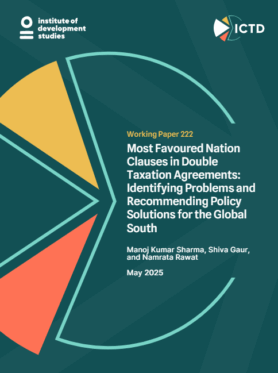Working Paper 222
Double taxation agreements (DTAs) usually ensure appropriate division of taxing rights and benefits between the treaty parties. However, when a DTA is between a capital-exporting and capital-importing country, the negotiations and DTA may be marred by the unequal bargaining power of the countries. Capital-exporting nations often influence the fundamental design of these treaties to favour the entities in their economies that are responsible for the capital outflow.
This paper aims to understand the potential detrimental impact of one clause – the most favoured nation (MFN) clause in DTAs – on revenue collection and tax certainty of host/capital-importing nations. The study considers recent tax litigation and controversies surrounding MFN clauses in India, South Africa, the Philippines, and Colombia, to assess the impact of negotiated MFN provisions on the Global South. Interestingly, neither the Organisation for Economic Cooperation and Development (OECD) nor the United Nations (UN) Model Tax Convention has a standard MFN provision. Therefore, we explore whether a template for MFN clauses can be framed to help Global South nations protect their interests against capital-exporting countries.
